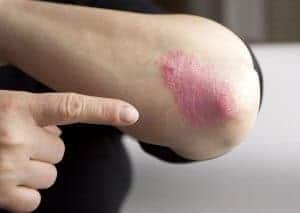
Do I have Psoriasis? Have you ever noticed dry, thick patches of scaly skin on your feet or ankles? If so, you may have a condition known as psoriasis.
What is psoriasis?
Psoriasis in the foot, Pittsburgh, Pa
An autoimmune condition that causes a quick build-up of skin cells on the skin’s surface, while there are 5 different types, 2 types in particular affect the feet and ankles: Plaque and Pustular :
What Are Symptoms Of Psoriasis?
If you are wondering how can you find out if you have psoriasis or not then here are some of the most common symptoms you may experience:
- Dry or cracked skin
- Bleeding from skin
- Itching
- Soreness
- Burning
- Rashes then flare up and subside again and again
- Scaly spots
What Are The Risk Factors Of Psoriasis?
Psoriasis is an immune system related diseases in which infection fighting bacteria accidentally starts attacking your healthy tissues.
This is the reason everyone can get this problem, but there are some risk factors that make psoriasis more likely to happen to you:
- Smoking
It has been found that smoking can increase the chances of you developing psoriasis since smoking restricts blood vessels which can badly affect your skin.
It only doesn’t causes psoriasis but it can worsen your situation even more.
Lastly, living with a person who smokes often also increases the chances of you developing this problem.
- Genetics
This problem isn’t contagious but unfortunately it’s a genetic disease.
And just like many other disease this means if your parents or grand parents have suffered from this problem then there are chances then you may suffer from it too.
- Skin Injuries
Any kind of skin injury such as scratches, vaccines, sunburns, scraps and scratches increases the chances of you developing psoriasis.
How To Prevent Psoriasis?
Completely preventing psoriasis isn’t possible but it’s possible to prevent it’s flare up and decrease your pain, you can try any of these remedies:
- Maintain A Healthy Skin
Maintaining a healthy skin isn’t so hard, all you have to do is wear sunscreen while going out, keep it clean and moisturize it daily!
- Remain Safe From Dry Or Cold Conditions
People who have a weak skin or a weakened skin health must protect themselves from dry or cold weathers.
What is the Koebner phenomenon, and how does it relate to psoriasis?
The Koebner phenomenon, also known as the Koebner response or isomorphic response, is a skin condition where new lesions or skin changes occur in areas of the skin that have been injured or traumatized. This phenomenon is named after Heinrich Koebner, a dermatologist who first described it in the 19th century.
In the context of psoriasis, the Koebner phenomenon is significant because many people with psoriasis experience new psoriatic lesions forming at sites of skin injury or trauma. This can include cuts, scrapes, burns, insect bites, or areas of skin affected by surgery. The Koebner phenomenon is thought to be related to the abnormal immune response in psoriasis, where the skin overreacts to minor injuries or irritations, leading to the formation of psoriatic plaques in these areas.
How does alcohol consumption affect psoriasis?
Alcohol consumption can have a negative impact on psoriasis in several ways:
1. Increased inflammation: Alcohol is known to increase inflammation in the body, which can exacerbate psoriasis symptoms.
2. Immune system suppression: Excessive alcohol consumption can weaken the immune system, making it harder for the body to fight off psoriasis flare-ups.
3. Liver damage: Alcohol can damage the liver, which plays a role in detoxifying the body. Liver damage can worsen psoriasis symptoms.
4. Medication interactions: Alcohol can interact with certain medications used to treat psoriasis, reducing their effectiveness or causing adverse effects.
Can psoriasis cause hair loss?
Psoriasis can lead to hair loss in some cases, particularly when it affects the scalp. This type of hair loss is known as psoriatic alopecia. Psoriatic alopecia can occur due to inflammation and scaling on the scalp, which can disrupt the hair follicles and lead to hair loss. Additionally, scratching or picking at the scalp due to itching caused by psoriasis can also contribute to hair loss.
Treatment options for Psoriasis
Firstly, it should be noted that it IS NOT CONTAGIOUS! So you can ease your worry that you may catch it or pass it anyone else with skin to skin contact. Secondly, while there is not currently a cure, it can be treated and managed. Some common treatment options include: topical steroids, topical ointments, photodynamic (light) therapy, and in severe cases oral medications, such as an immunosuppressant.
Still not sure what you have on your feet?
Psoriasis is often mistaken for other skin conditions such as Tinea Pedis (Athlete’s Foot), contact dermatitis, irritant dermatitis, and eczema. It also can affect a person’s toenails causing them to believe that they may have fungus. If you suspect that you have a skin condition in your feet or ankles, call now to schedule an appointment with your local Pittsburgh podiatrist 878-313-FEET (3338).
Click Here to E-mail Dr. Christina Teimouri
Skin rejuvenation treatments available at Body Beautiful, call 724-987-3221
10 locations to serve you


